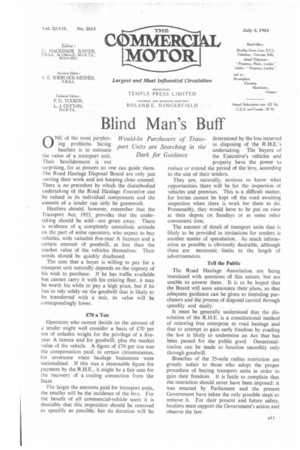Blind Man's Buff .
Page 45

If you've noticed an error in this article please click here to report it so we can fix it.
Would-be Purchasers of Transport Units are Searching in the Dark for Guidance ONE of the most perplexing problems facing hauliers is to estimate the value of a transport unit. Their bewilderment is not surprising, for at present no one can guide them. The Road Haulage Disposal Board are only just starting their work and are keeping close counsel. There is no precedent by which the disembodied undertaking of the Road Haulage Executive can be valued in its individual components and the amount of a tender can only be guesswork.
Hauliers should, however, remember that the Transport Act, 1953, provides that the undertaking should be sold—not given away. There is evidence of a, completely unrealistic attitude on the part of some operators, who expect to buy vehicles, with valuable five-year A licences and a certain amount of goodwill, at less than the market value of the vehicles themselves. Their minds should be quickly disabused.
The sum that a buyer is willing to pay for a transport unit naturally depends on the urgency of his wish to purchase. If he has traffic available but cannot carry it with his existing fleet, it may be worth his while to pay a high price, but if he has to rely solely, on the goodwill that is likely to be transferred with a unit, its value will be correspondingly lower.
170 a Ton Operators who cannot decide on the amount of a tender might well consider a basis of £70 per ton of unladen weight for the privilege of a fiveyear A licence and for goodwill, plus the market value of the vehicle. A figure of £70 per ton was the compensation paid, in certain circumstances, for severance when haulage businesses were nationalized. If this was a reasonable figure for payment by the R.H.E., it might be a fair sum for the recovery of a trading connection from the State.
The larger the amounts paid for transport units, the smaller will be the incidence of the levy. For the benefit of all commercial-vehicle users it is desirable that this imposition should be removed as speedily as possible, but its duration will be determined by the loss incurred in disposing of the R.H.E.'s undertaking. The buyers of the Executive's vehicles and property have the power to reduce or extend the period of the levy, according to the size of their tenders.
They are, naturally, anxious to know what opportunities there will be for the inspection of vehicles and premises. This is a difficult matter, for lorries cannot be kept off the road awaiting inspection when there is work for them to do. Presumably, they would have to be put on view at their depots on Sundays or at some other convenient time.
The amount of detail of transport units that is likely to be provided in invitations for tenders is another matter of speculation. As much information as possible is obviously desirable, although there are economic limits to the length of advertisements.
Tell the Public The Road Haulage Association are being inundated with questions of this nature, but are unable to answer them. It is to be hoped that the Board will soon announce their plans, so that adequate guidance can be given to intending purchasers and the process of disposal carried through speedily and easily. , It must be generally understood that the dissolution of the R.H.E. is a constitutional method of restoring free enterprise to road haulage and that to attempt to gain early freedom by evading the law is likely to undermine an Act that has been passed for the public good. Denationalization can be made to function smoothly only through goodwill.
Breaches of the 25-mile radius restriction are grossly unfair to those who adopt the proper procedure of buying transport units in order to gain their freedom. It is futile to complain that the restriction should never have been imposed: it was enacted by Parliament and the present Government have taken the only possible steps to remove it. For their present and future safety, hauliers must support the Government's action and observe the law.




























































































































































